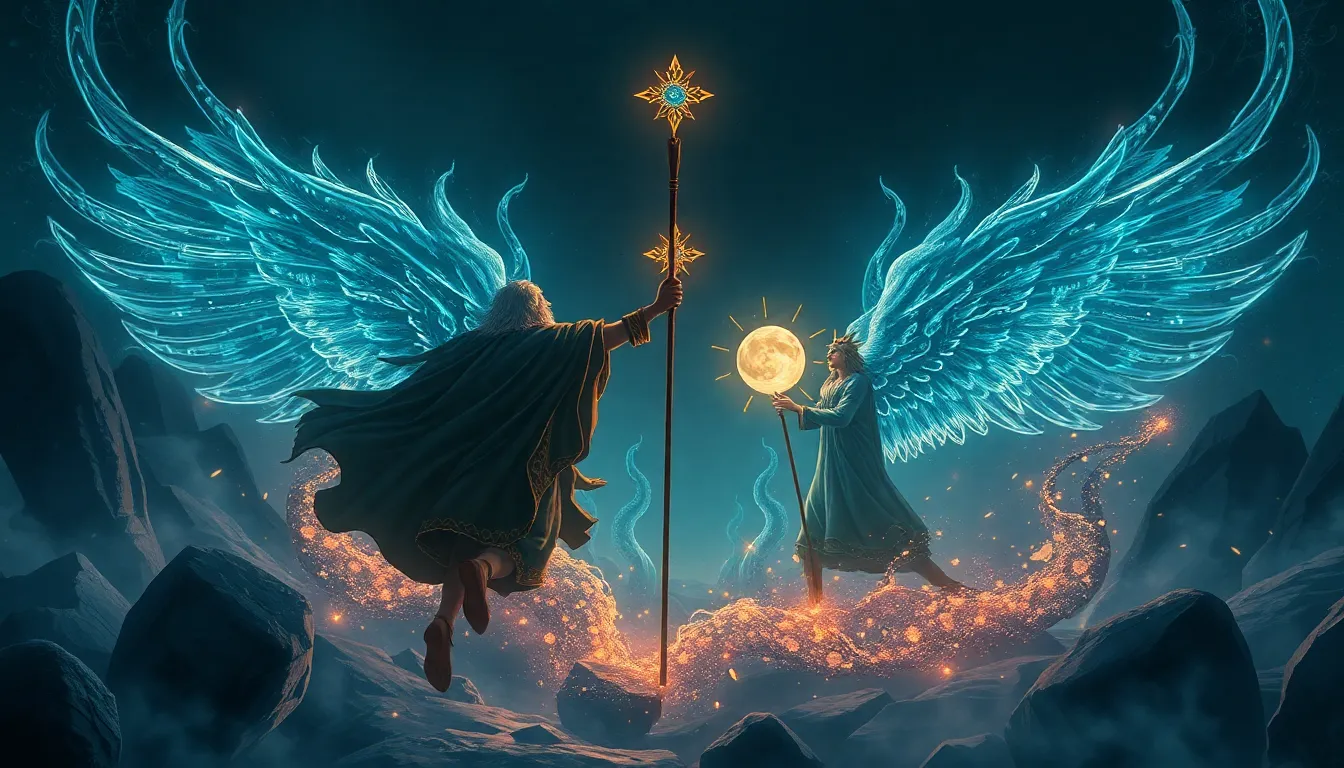The Role of Fate in Moral Myths: Are We in Control?
I. Introduction
Moral myths are narratives that shape our understanding of right and wrong, often embedded in cultural traditions and historical teachings. They serve as a guide for ethical behavior and influence societal norms. The concept of fate, on the other hand, refers to the idea that events are predetermined and beyond human control, often intertwined with notions of destiny and divine will. This article explores the intricate interplay between fate and moral decision-making, questioning whether we are in control of our moral choices or simply subject to predetermined outcomes.
II. Historical Perspectives on Fate and Morality
A. Ancient philosophies: Fate in Greek and Roman thought
In ancient Greece, fate was personified by the Moirai, or Fates, who controlled the thread of life for every individual. The Greeks believed that while humans possessed free will, their fates were predetermined, creating a complex relationship between autonomy and destiny. Similarly, in Roman thought, fate (Fatum) was considered an inescapable force that could not be altered, leading to acceptance of one’s circumstances as part of a larger cosmic order.
B. Religious interpretations: Fate in major world religions
Many world religions incorporate the concept of fate into their moral frameworks. For instance:
- Christianity: The belief in divine providence suggests that God has a plan for every individual, influencing moral choices and outcomes.
- Islam: The concept of Qadar indicates that all events are preordained by Allah, shaping the moral responsibilities of individuals.
- Hinduism: Karma illustrates the notion that one’s actions influence their fate in future lives, blending moral agency with predetermined consequences.
C. The evolution of moral myths through history
Throughout history, moral myths have evolved, adapting to changing societal values and beliefs about fate. From ancient epics to modern literature, these narratives reflect humanity’s ongoing struggle to understand the balance between free will and determinism.
III. The Dichotomy of Free Will vs. Determinism
A. Understanding free will in moral decision-making
Free will is often viewed as the ability to make choices unaffected by external constraints. This concept is crucial in moral decision-making, as it implies that individuals are responsible for their actions and the associated consequences.
B. The concept of determinism and its implications for morality
Determinism posits that every event, including human actions, is determined by preceding events in accordance with the natural laws. This raises questions about moral responsibility: if our choices are predetermined, can we truly be held accountable for our actions?
C. Case studies: Historical figures faced with moral dilemmas
Examining historical figures can illuminate the tension between free will and determinism:
- Socrates: Faced with death for his beliefs, Socrates chose to accept his fate rather than compromise his principles.
- Martin Luther King Jr.: His moral choices in the face of systemic injustice highlight the interplay of personal agency and societal fate.
IV. Fate in Cultural Narratives and Myths
A. Analysis of key myths featuring fate (e.g., Oedipus, Prometheus)
Myths such as Oedipus Rex illustrate the tragic consequences of trying to escape fate. Oedipus’s attempts to avoid his prophesied destiny ultimately lead him to fulfill it, highlighting the futility of resisting predetermined outcomes.
B. The role of fate in folklore and literature
Folklore often portrays characters grappling with fate, reinforcing societal values regarding morality and control. Literature, from Shakespeare to modern novels, continues to explore these themes, reflecting humanity’s fascination with fate and free will.
C. How these narratives shape societal views on morality and control
Cultural narratives about fate influence collective beliefs, shaping how societies view moral responsibility and justice. These stories often serve as cautionary tales, reminding individuals of the limits of human agency.
V. Psychological Perspectives on Fate and Morality
A. The psychological impact of believing in fate
Believing in fate can have profound psychological effects. It may offer comfort in difficult situations, providing individuals with a sense of purpose or meaning in their suffering. However, it can also lead to fatalism, where individuals feel powerless to change their circumstances.
B. Cognitive dissonance between fate acceptance and moral agency
The tension between accepting fate and exercising moral agency can create cognitive dissonance. Individuals may struggle to reconcile their belief in a predetermined fate with their desire to be seen as morally responsible for their choices.
C. Studies on individuals’ perceptions of control in moral situations
Research indicates that individuals who perceive greater control over their lives are more likely to engage in moral behavior. Conversely, those who attribute outcomes to fate may feel less responsible for their actions, impacting moral decision-making.
VI. Fate and Moral Responsibility
A. The implications of fate on accountability and guilt
The relationship between fate and moral responsibility raises questions about accountability. If actions are seen as fated, individuals may experience less guilt for their choices, complicating moral judgments.
B. How different cultures assign moral responsibility in light of fate
Cultural perceptions of fate significantly influence how moral responsibility is assigned. For instance, collectivist cultures may emphasize communal fate and shared responsibility, while individualistic cultures focus on personal agency.
C. The challenge of reconciling fate with justice systems
Justice systems grapple with the implications of fate on accountability. Legal frameworks often require a balance between recognizing individual agency and considering the broader societal factors that influence behavior.
VII. Modern Interpretations of Fate and Morality
A. The influence of contemporary philosophy on fate and free will
Modern philosophical discourse continues to examine the concepts of fate and free will, often intersecting with discussions on ethics and morality. Philosophers debate the extent to which modern understandings of science and psychology influence these age-old questions.
B. The role of fate in modern storytelling (film, literature, etc.)
Contemporary storytelling often revisits themes of fate, presenting complex characters who navigate moral dilemmas. Films and novels frequently depict the struggle between accepting fate and exercising free will, resonating with audiences’ personal experiences.
C. Social media and the narrative of fate in individual lives
In the age of social media, narratives around fate have evolved. Individuals often share their personal stories of overcoming adversity, framing their experiences in the context of fate and agency, influencing public perceptions of morality.
VIII. Case Studies: Fate and Moral Choices in Real Life
A. Personal stories highlighting the struggle between fate and moral agency
Many individuals recount personal experiences where they faced significant moral choices while feeling the weight of fate. These narratives often reveal deep insights into the human condition and the complexities of moral agency.
B. Examination of historical events where fate appeared to dictate moral outcomes
Historical events, such as wars and revolutions, often showcase how fate can dictate moral outcomes, with individuals caught in circumstances beyond their control. These events serve as poignant reminders of the interplay between fate and morality.
C. Lessons learned from these case studies
Analyzing these case studies can yield valuable lessons about the importance of recognizing both fate and moral agency in shaping human behavior and societal norms.
IX. The Future of Fate in Moral Myths
A. Predictions on how fate will continue to influence morality
As society evolves, the narratives surrounding fate and morality are likely to transform. Future moral myths may reflect emerging technological and scientific advancements, reshaping our understanding of control and agency.
B. The potential impact of technology and science on our understanding of fate
Advancements in technology and science may challenge traditional notions of fate, offering new insights into human behavior and decision-making. These developments could influence how we perceive moral responsibility in an increasingly complex world.
C. How emerging narratives may reshape our views on control and morality
Emerging narratives, particularly in digital media, may offer fresh perspectives on the interplay of fate and moral agency. As individuals share their stories, these narratives can shift societal views on how fate and morality are interconnected.
X. Conclusion</h2



